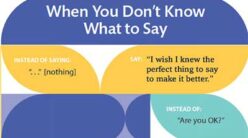“Do you know what I really like to do?” my friend Erin asked.
“What?”
“I love to watch kids play.”
Huh?
I didn’t totally understand, but, yeah, that’s Erin’s favorite pastime. Watching kids play. She loves it.
Listening to her explain (unintentionally, I had uttered the “huh?” aloud), I realized that her offbeat diversion is a really good fit for her. Erin is a highly regarded children’s speech therapist. Observing play helps her relate to her small patients more naturally. It helps her know how to put them at ease and what things they yearn to express if only they could. Plus, Erin’s hobby is helping prepare her for a future aspiration. She wants to write plays for kids to act out—maybe at camp, church, or in school drama clubs. As she spoke, I imagined what her adventurous, exciting children’s plays would be like. Kids would love them.
So much goodness and potential for enrichment comes from Erin’s seemingly unusual pastime. Hobbies have a way of enriching your life, work, and relationships. They give you something new to talk about, and they make life (or dare I say, you) more interesting. And they can be as unique as you are.
Is Watching TV Your Hobby?
Many of us tend to log screen time instead of indulging in some sort of engaging pastime. After a stressful day, nothing may seem more appealing than binge-watching television. But for most people, that’s not exactly a cozy, family activity. Studies have found that splurging on television (watching about three episodes or more) is usually a solo activity. And it’s probably not as relaxing as you’d think. Research published in the Journal of Clinical Sleep Medicine reported poor sleep quality in binge watchers.
Additionally, too much screen time may cause us to feel jaded about life in general. Norman Doidge, psychiatrist and author of The Brain That Changes Itself: Stories of Personal Triumph from the Frontiers of Brain Science, describes how our heart rate and brain try to keep up with the frantic images, the visual stimulation, and the loud, sudden noises on-screen.
“Because typical music videos, action sequences, and commercials trigger orienting responses at a rate of one per second, watching them puts us into continuous orienting response with no recovery,” writes Doidge. “No wonder people report feeling drained from watching TV. Yet we acquire a taste for it and find slower changes boring.” Maybe you can relate: Do you feel like life is overstimulating, yet boring?
How Hobbies Make You Happier and Healthier
There’s evidence that fun diversions contribute to good health. One study showed that people who engage in hobbies enjoy better moods, feel more interested, and have less stress and lower heart rates—even hours after the recreation time. Embracing a hobby can also sharpen your ability to solve problems in other areas of life and can spin-off into unexpected skills, maybe even inspiring a new career.
Pastimes improve your social well-being too. In his book Bowling Alone, author Robert Putnam describes—alongside substantial research––how Americans have retreated into isolation. He writes that while people may still do things, like bowling, for example, they tend to do them alone. Instinctively, we know we need to connect through common interests, but we are doing it less frequently.
Psychology professor and columnist Jaime Kurtz, Ph.D., writes, “Over a couple of generations, Americans have somehow misplaced their free time.” Many of us may retort, “What free time?” But the lesson here is that tasks tend to absorb as much time as you’re willing to give them. According to Kurtz, not many of us are legitimately super-busy; instead, we habitually waste time, creating the illusion of busyness.
Busyness can be difficult to put aside. Culturally, it seems to be a measure of status and significance. If you’re one of the people stuck in the habit of wasting time, hobbies can help break the dead-end routine. Active leisure can promote that feeling of losing yourself in doing, and that “flow” is one of the things worthy of putting on the schedule.
Choosing the Right Hobby for You
Some people need intensity and excitement to feel engaged. But it’s also true that a thrill-seeking person who loves to jump out of airplanes may also crave calligraphy. Research indicates that any healthy hobby that you enjoy is good for you, so choose based on appeal and the kind of experience you’d like to have.
As you hunt for a hobby, clues can be found in your childhood. What did you migrate toward as a tot? Do your favorite memories suggest an activity that you could take up again?
If a hobby initially sounded good but you find it harbors a dread factor, then dump it. You have plenty of things in life that you must do, so your hobby shouldn’t be overwhelming or boring. That said, it’s important to note that hobbies are like any other pursuit in life: you get out what you put in. Before you move on to something else, really give your hobby a chance through passionately engaging it and trying to learn something new.
Here are some ideas that might inspire you:
Creative & Classic
• reading
improves your vocabulary and your mind; reduces stress
• owning a pet
may lower blood pressure; sure to increase smiles
• crafting
eases stress, anxiety, and depression; decreases inflammation and chronic pain; increases happiness and protects the brain
Challenging & Adventurous
• skiing/snow–boarding or kitewinging
(skiing plus “flying”)
experience an adventure and a workout at the same time
• playing an instrument
improves fine motor skills; raises IQ
• surfing
offers an amazing workout and an escape from stress
• learning a language
makes you smarter; connects you to a new community
• chess
engages both sides of the brain; develops strategic thinking
• horseback riding
uses muscles you didn’t know you had; can lead to bonding with people—and horses
Enriching & Inspiring
• cooking
can jumpstart a healthier lifestyle through better nutrition; saves money; encourages bonding with family and friends over home-cooked meals
• gardening
indoors or out, spending time in the soil is good for the body and soul
• podcasting
allows you to share what you know; topics that you’re passionate about
• writing
journal your thoughts, write poetry or letters, or work on a memoir
• making ordinary days special
pack picnics for every season, camp in your backyard, create a mini art studio for yourself, or start a new daily ritual that inspires you
Frivolous & Fun
• tree shaping
try bonsai, or check out Axel Erlandson’s work for large-scale inspiration
• duct tape creations
craft shoes, cards, and sculptures, like duct tape artist Melody Williams
• juggling
improves mental focus; even increases certain areas of the brain
• Rubik’s Cube
solving the colorful cube is back—for an extra challenge, try setting a timer
• geocaching
gets you out in nature, and who doesn’t like a treasure hunt?
Michele Deppe is a happy hobbyist in Seattle, Washington. She’s learning how to sew animal shapes fashioned from felt.






